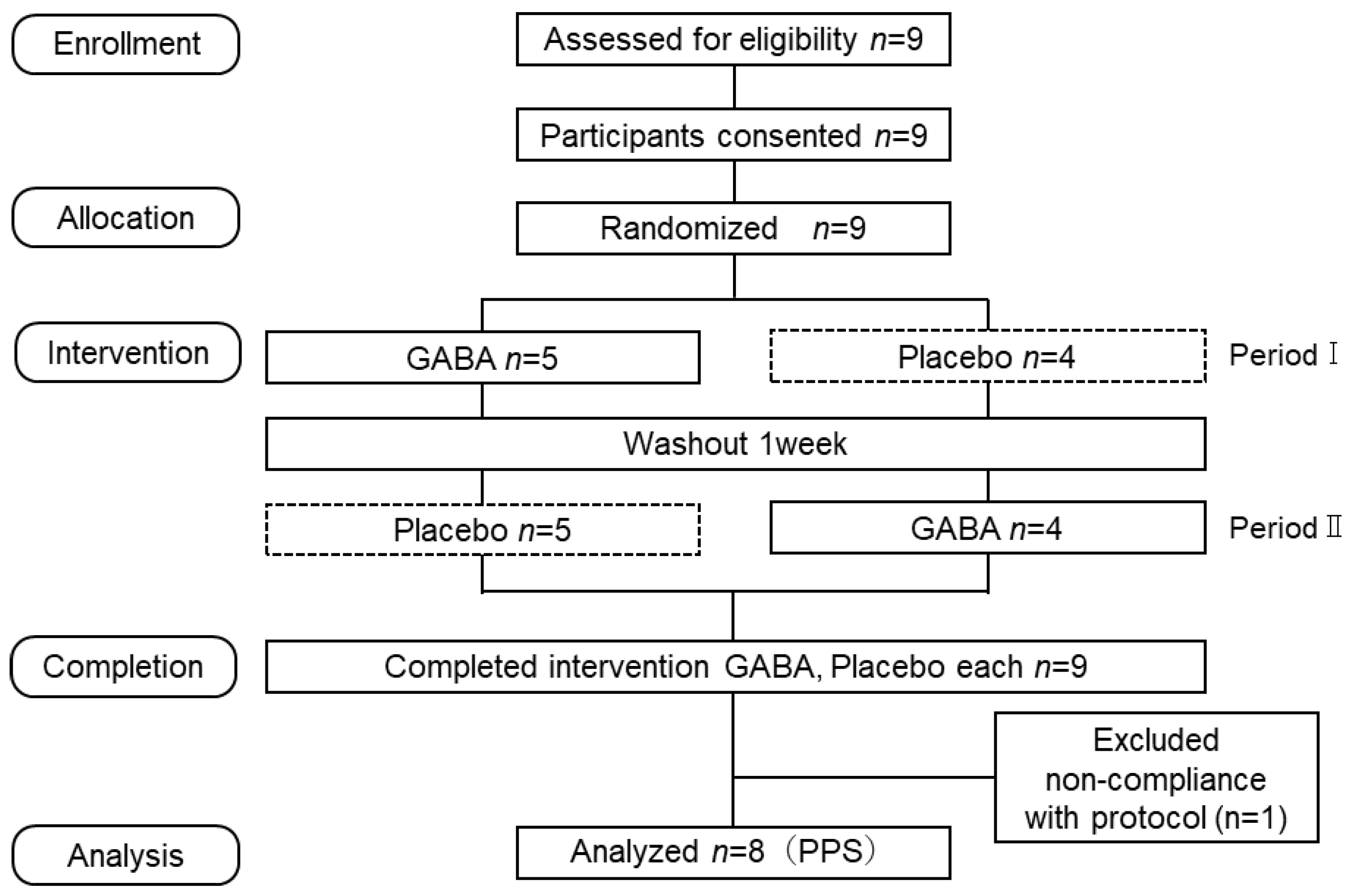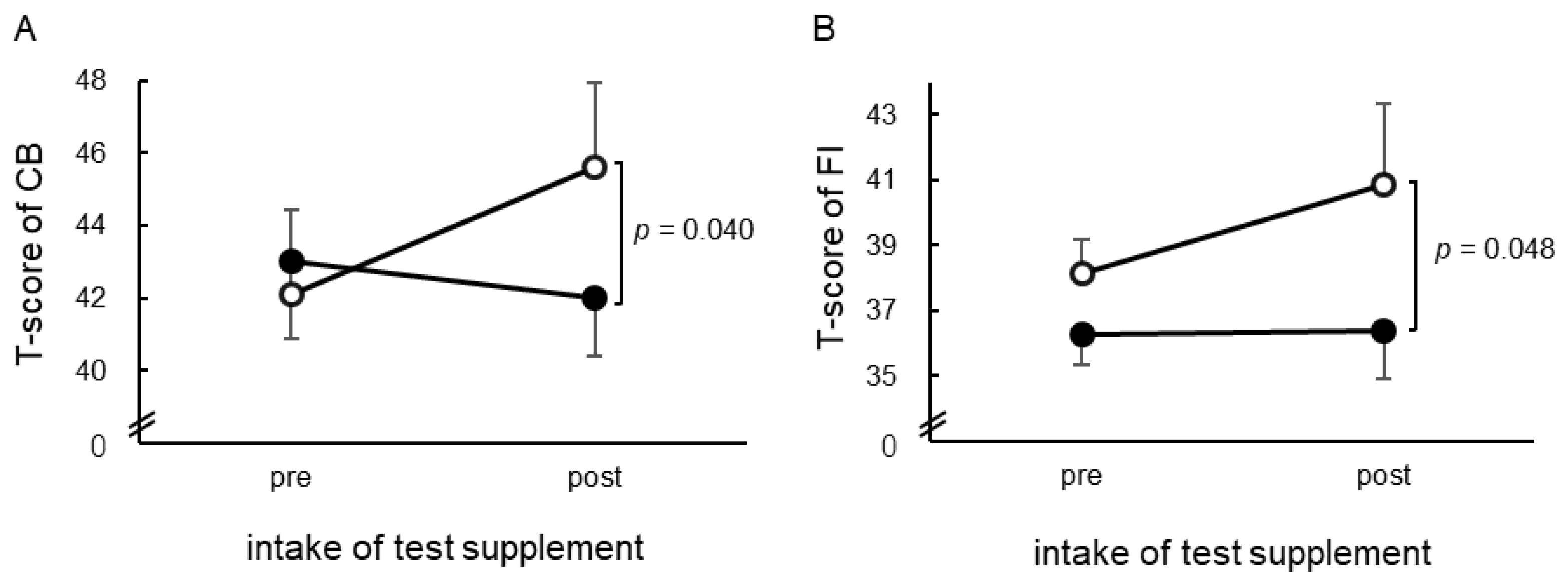γ-Aminobutyric Acid Intake Improves Psychological State and Performance in Esports: A Randomized, Placebo-Controlled, Double-Blind Crossover Study
Abstract
1. Introduction
2. Materials and Methods
2.1. Participants
2.2. Procedures
2.3. Test Product
2.4. Assessment of Psychological State (Mood State)
2.5. Adopted Game and Mobalytics Proving Ground™ Assessment
2.6. Analysis
3. Results
3.1. Participant Demographics and CONSORT Flow Diagram
3.2. Effects of GABA Intake on the Assessment of Psychological State
3.3. Effect of GABA Intake on Game Score
4. Discussion
5. Conclusions
Supplementary Materials
Author Contributions
Funding
Institutional Review Board Statement
Informed Consent Statement
Data Availability Statement
Acknowledgments
Conflicts of Interest
References
- Yin, K.; Zi, Y.; Zhuang, W.; Gao, Y.; Tong, Y.; Song, L.; Liu, Y. Linking Esports to health risks and benefits: Current knowledge and future research needs. J. Sport Health Sci. 2020, 9, 485–488. [Google Scholar] [CrossRef] [PubMed]
- Thiel, A.; John, J.M. Is eSport a ‘real’ sport? Reflections on the spread of virtual competitions. Eur. J. Sport Soc. 2018, 15, 311–315. [Google Scholar] [CrossRef]
- Leis, O.; Sharpe, B.T.; Pelikan, V.; Fritsch, J.; Nicholls, A.R.; Poulus, D. Stressors and coping strategies in esports: A systematic review. Int. Rev. Sport Exer. Psychol. 2024, 1–31. [Google Scholar] [CrossRef]
- Himmelstein, D.; Liu, Y.; Shapiro, J.L. An exploration of mental skills among competitive league of legend players. Int. J. Gaming Comput. Mediat. Simul. 2017, 9, 1–21. [Google Scholar] [CrossRef]
- Pedraza-Ramirez, I.; Musculus, L.; Raab, M.; Laborde, S. Setting the scientific stage for esports psychology: A systematic review. Int. Rev. Sport Exer. Psychol. 2020, 13, 319–352. [Google Scholar] [CrossRef]
- Karayigit, R.; Naderi, A.; Akca, F.; Cruz, C.J.G.D.; Sarshin, A.; Yasli, B.C.; Ersoz, G.; Kaviani, M. Effects of different doses of caffeinated coffee on muscular endurance, cognitive performance, and cardiac autonomic modulation in caffeine naive female athletes. Nutrients 2020, 13, 2. [Google Scholar] [CrossRef]
- Yilmaz, U.; Buzdağlı, Y.; Polat, M.L.; Bakir, Y.; Ozhanci, B.; Alkazan, S.; Uçar, H. Effect of Single or Combined Caffeine and L-Theanine Supplementation on Shooting and Cognitive Performance in Elite Curling Athletes: A Double-Blind, Placebo-Controlled Study. J. Int. Soc. Sports Nutr. 2023, 20, 2267536. [Google Scholar] [CrossRef]
- Pomportes, L.; Brisswalter, J.; Hays, A.; Davranche, K. Effects of Carbohydrate, Caffeine, and Guarana on Cognitive Performance, Perceived Exertion, and Shooting Performance in High-Level Athletes. Int. J. Sports Physiol. Perform. 2019, 14, 576–582. [Google Scholar] [CrossRef]
- Rogers, E.J.; Trotter, M.G.; Johnson, D.; Desbrow, B.; King, N. Caffeine improves the shooting performance and reaction time of first-person shooter esports players: A dose-response study. Front. Sports Act. Living 2024, 6, 1437700. [Google Scholar] [CrossRef]
- Thomas, C.J.; Rothschild, J.; Earnest, C.P.; Blaisdell, A. The Effects of Energy Drink Consumption on Cognitive and Physical Performance in Elite League of Legends Players. Sports 2019, 7, 196. [Google Scholar] [CrossRef]
- Briguglio, M.; Dell’Osso, B.; Panzica, G.; Malgaroli, A.; Banfi, G.; Zanaboni Dina, C.; Galentino, R.; Porta, M. Dietary neurotransmitters: A narrative review on current knowledge. Nutrients 2018, 10, 591. [Google Scholar] [CrossRef] [PubMed]
- Horie, N.; Yokoyama, Y.; Kojima, H.; Takeshima, K.; Masuda, K.; Kim, M.; Yamane, T. Long-term human safety test of orally administered GABA. Jpn. Pharmacol. Ther. 2011, 39, 665–669. [Google Scholar]
- Li, J.; Zhang, Z.; Liu, X.; Wang, Y.; Mao, F.; Mao, J.; Lu, X.; Jiang, D.; Wan, Y.; Lv, J.-Y.; et al. Study of GABA in Healthy Volunteers: Pharmacokinetics and Pharmacodynamics. Front. Pharmacol. 2015, 6, 260. [Google Scholar] [CrossRef]
- Tashiro, K.; Sakakibara, H.; Yokoyama, D.; Uehara, T.; Matsuura, Y.; Sakono, M. Consumption of salted pickles of sun-dried radish roots (Raphanus sativus cv. YR-Hyuga-Risou) Attenuates Blood Pressure in Spontaneously Hypertensive Rats. Food Sci. Technol. Res. 2017, 23, 757–763. [Google Scholar] [CrossRef]
- Kanehira, T.; Nakamura, Y.; Nakamura, K.; Horie, K.; Horie, N.; Furugori, K.; Sauchi, Y.; Yokogoshi, H. Relieving occupational fatigue by consumption of a beverage containing gamma-amino butyric acid. J. Nutr. Sci. Vitaminol. 2011, 57, 9–15. [Google Scholar] [CrossRef]
- Yamatsu, A.; Nakamura, U.; Hossain, M.S.; Horie, N.; Kaneko, T.; Kim, M. Intake of 200 mg/day of γ-aminobutyric acid (GABA) improves a wide range of cognitive functions: A Randomized, Double-Blind, Placebo-Controlled Clinical Trial. Jpn. Pharmacol. Ther. 2020, 48, 461–474. [Google Scholar]
- Yoto, A.; Murao, S.; Motoki, M.; Yokoyama, Y.; Horie, N.; Takeshima, K.; Masuda, K.; Kim, M.; Yokogoshi, H. Oral intake of GABA affects mood and activities of central nervous system during stressed condition induced by mental tasks. Amino Acids 2012, 43, 1331–1337. [Google Scholar] [CrossRef]
- Abdou, A.M.; Higashiguchi, S.; Horie, K.; Kim, M.; Hatta, H.; Yokogoshi, H. Relaxation and immunity enhancement effects of γ-aminobutyric acid (GABA) administration in humans. BioFactors 2006, 26, 201–208. [Google Scholar] [CrossRef]
- Furukado, R.; Hagiwara, G. Examining the effects of digital gameplay of the racing genre on mood and heart rate. J. Digit. Life 2021, 1, 5. [Google Scholar] [CrossRef]
- Konuma, H.; Hirose, H.; Yokoyama, K. Relationship of the Japanese translation of the Profile of Mood States Second Edition (POMS 2®) to the first edition (POMS®). Juntendo Med. J. 2015, 61, 517–519. [Google Scholar] [CrossRef]
- Pluss, M.A.; Novak, A.R.; Bennett, K.J.M.; Panchuk, D.; Coutts, A.J.; Fransen, J. The reliability and validity of mobalytics proving ground as a perceptual-motor skill assessment for esports. Int. J. Sports Sci. Coach. 2023, 18, 470–479. [Google Scholar] [CrossRef]
- Baddeley, A. Working memory. Science 1992, 255, 556–559. [Google Scholar] [CrossRef]
- Yamatsu, A.; Yamashita, Y.; Shibata, M.; Yoneyama, M.; Horie, K.; Horie, N.; Kim, M.; Yokogoshi, H. The beneficial effects of coffee on stress and fatigue can be enhanced by the addition of GABA. Jpn. Pharmacol. Ther. 2015, 43, 515–519. [Google Scholar]
- Zhang, W.; Xu, Y.; Du, K. Comparison of Propofol and Dexmedetomidine Sedation in Septic Shock. Crit. Care Med. 2019, 47, e1041. [Google Scholar] [CrossRef]
- Nakamura, H.; Takishima, T.; Kometani, T.; Yokogoshi, H. Psychological stress-reducing effect of chocolate enriched with γ-aminobutyric acid (GABA) in humans: Assessment of stress using heart rate variability and salivary chromogranin A. Int. J. Food Sci. Nutr. 2009, 60 (Suppl. S5), 106–113. [Google Scholar] [CrossRef] [PubMed]
- Okita, Y.; Nakamura, H.; Kouda, K.; Takahashi, I.; Takaoka, T.; Kimura, M.; Sugiura, T. Effects of vegetable containing gamma-aminobutyric acid on the cardiac autonomic nervous system in healthy young people. J. Physiol. Anthropol. 2009, 28, 101–107. [Google Scholar] [CrossRef]
- Barber, J.B.; John, M. Parasympathetic Arousal–Related Cortical Activity Is Associated with Enhanced Cognitive Performance. Int. J. Psychophysiol. 2019, 146, 44–52. [Google Scholar] [CrossRef]
- Nakamura, U.; Nohmi, T.; Sagane, R.; Hai, J.; Ohbayashi, K.; Miyazaki, M.; Yamatsu, A.; Kim, M.; Iwasaki, Y. Dietary gamma-aminobutyric acid (GABA) induces satiation by enhancing the postprandial activation of vagal afferent nerves. Nutrients 2022, 14, 2492. [Google Scholar] [CrossRef]
- Nehlig, A. Is Caffeine a Cognitive Enhancer? J. Alzheimers Dis. 2010, 20 (Suppl. S1), S85–S94. [Google Scholar] [CrossRef]


 ) indicate the GABA group, while open circles (
) indicate the GABA group, while open circles ( ) indicate the placebo group. Before (Pre) refers to the state prior to GABA or placebo intake, while after (Post) refers to the state following the GABA or placebo intake. The results indicate the mean ± standard error (SE). Significant differences were examined using ANCOVA (n = 8).
) indicate the placebo group. Before (Pre) refers to the state prior to GABA or placebo intake, while after (Post) refers to the state following the GABA or placebo intake. The results indicate the mean ± standard error (SE). Significant differences were examined using ANCOVA (n = 8).
 ) indicate the GABA group, while open circles (
) indicate the GABA group, while open circles ( ) indicate the placebo group. Before (Pre) refers to the state prior to GABA or placebo intake, while after (Post) refers to the state following the GABA or placebo intake. The results indicate the mean ± standard error (SE). Significant differences were examined using ANCOVA (n = 8).
) indicate the placebo group. Before (Pre) refers to the state prior to GABA or placebo intake, while after (Post) refers to the state following the GABA or placebo intake. The results indicate the mean ± standard error (SE). Significant differences were examined using ANCOVA (n = 8).
 ) indicate the GABA group, while open circles (
) indicate the GABA group, while open circles ( ) indicate the placebo group. The results indicate the mean ± standard error (SE). Significant differences were examined using a mixed model, with treatment and number of sessions as fixed variables and subject as a random effect (n = 8).
) indicate the placebo group. The results indicate the mean ± standard error (SE). Significant differences were examined using a mixed model, with treatment and number of sessions as fixed variables and subject as a random effect (n = 8).
 ) indicate the GABA group, while open circles (
) indicate the GABA group, while open circles ( ) indicate the placebo group. The results indicate the mean ± standard error (SE). Significant differences were examined using a mixed model, with treatment and number of sessions as fixed variables and subject as a random effect (n = 8).
) indicate the placebo group. The results indicate the mean ± standard error (SE). Significant differences were examined using a mixed model, with treatment and number of sessions as fixed variables and subject as a random effect (n = 8).
Disclaimer/Publisher’s Note: The statements, opinions and data contained in all publications are solely those of the individual author(s) and contributor(s) and not of MDPI and/or the editor(s). MDPI and/or the editor(s) disclaim responsibility for any injury to people or property resulting from any ideas, methods, instructions or products referred to in the content. |
© 2025 by the authors. Licensee MDPI, Basel, Switzerland. This article is an open access article distributed under the terms and conditions of the Creative Commons Attribution (CC BY) license (https://creativecommons.org/licenses/by/4.0/).
Share and Cite
Hara, Y.; Nakamura, U.; Koga, K.; Yamashita, Y.; Kim, Y.; Hagiwara, G.; Furukado, R. γ-Aminobutyric Acid Intake Improves Psychological State and Performance in Esports: A Randomized, Placebo-Controlled, Double-Blind Crossover Study. Nutrients 2025, 17, 1870. https://doi.org/10.3390/nu17111870
Hara Y, Nakamura U, Koga K, Yamashita Y, Kim Y, Hagiwara G, Furukado R. γ-Aminobutyric Acid Intake Improves Psychological State and Performance in Esports: A Randomized, Placebo-Controlled, Double-Blind Crossover Study. Nutrients. 2025; 17(11):1870. https://doi.org/10.3390/nu17111870
Chicago/Turabian StyleHara, Yoshihiro, Utano Nakamura, Keita Koga, Yusuke Yamashita, Youngil Kim, Goichi Hagiwara, and Ryousuke Furukado. 2025. "γ-Aminobutyric Acid Intake Improves Psychological State and Performance in Esports: A Randomized, Placebo-Controlled, Double-Blind Crossover Study" Nutrients 17, no. 11: 1870. https://doi.org/10.3390/nu17111870
APA StyleHara, Y., Nakamura, U., Koga, K., Yamashita, Y., Kim, Y., Hagiwara, G., & Furukado, R. (2025). γ-Aminobutyric Acid Intake Improves Psychological State and Performance in Esports: A Randomized, Placebo-Controlled, Double-Blind Crossover Study. Nutrients, 17(11), 1870. https://doi.org/10.3390/nu17111870





